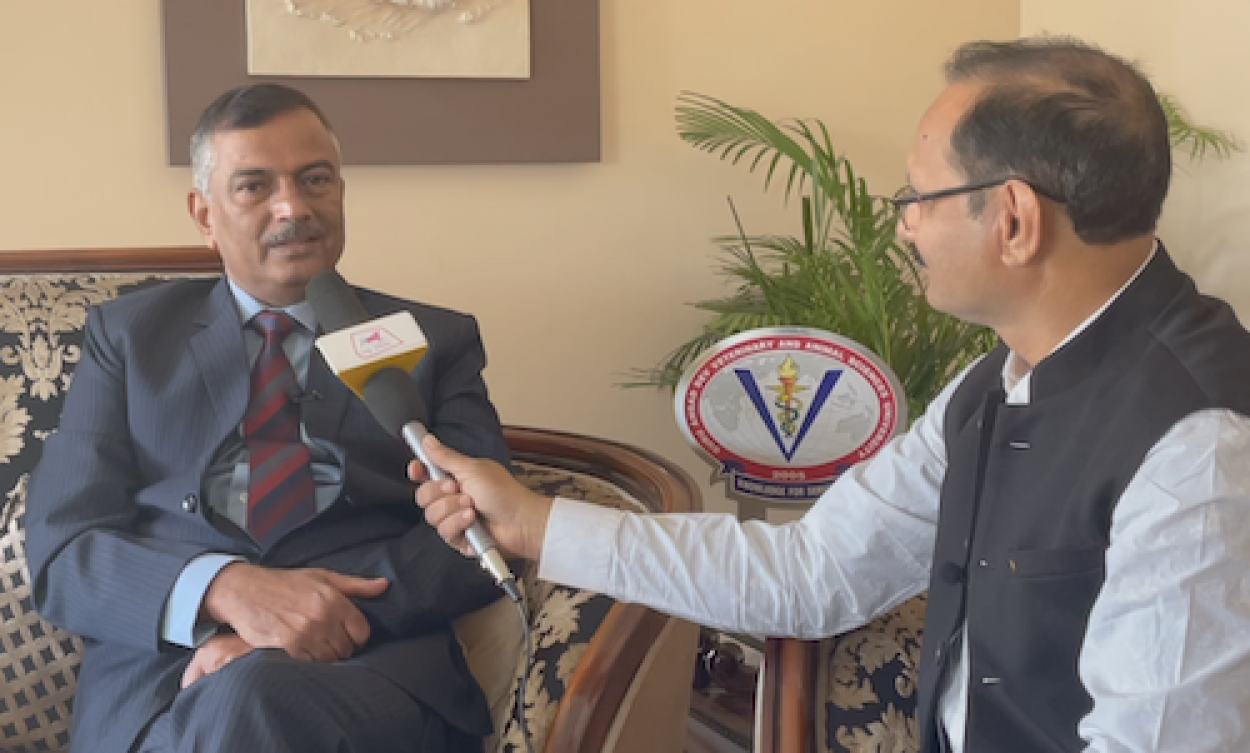
University Education must empower students to earn respectable livelihood: Dr Inderjeet Singh
Pashu Sandesh, 01 Jan 2022
Guru Angad Dev Veterinary and Animal Science University (GADVASU), Ludhiana Punjab, has achieved many milestones within a short span of time and the credit must go to its dynamic and versatile leadership under the stewardship of Dr Inderjeet Singh, Vice-Chancellor GADVASU. Dr Inderjeet Singh popularly known as “ Murrah Man” of India for his contribution to the up-gradation of the Murrah buffalo breed, has motivated one and all at GADVASU to achieve excellence. Recently Dr Inderjeet Singh has been elected as the President of the International Society of Buffalo Development (ISBD). Pashu Sandesh has talked in detail with Dr Inderjeet Singh about his vision and journey so far as the VC of GADVASU.
Pashu Sandesh(PS): Being the Vice-chancellor of a reputed university, our first question to you is that, what is the basic purpose of a University education?
Dr Inderjeet Singh (IJS)– The first and foremost duty of every government is to provide quality education to its children so that they can become confident responsible citizens and contribute to the growth and development of the nation in a holistic manner. Along with character building, knowledge, and skill development are essential for a citizen to earn his livelihood. The basic purpose of university education is to make a student capable of earning his livelihood in a respectable manner. If an education system achieves this, there can be no other system better than this. The products of such an education system would not run after the jobs rather they will practice their knowledge and skills to earn their livelihood as well as contribute to the growth and development of the society. Our new education policy is a good move in this direction.
PS- What are your views on the new education policy(NEP)?
IJS- After 34 years we got a new education policy(NEP), which is drafted by a panel headed by eminent scientist and former ISRO Chairman Dr Kasturiranjan. It is a forward-looking education policy with flexible education plans and it is more focused on skill development. I welcome this policy. NEP provides more options in choosing the subjects and more flexibility to enter and exit the course. Undergraduates will now have the option to choose the number of years as per their professional requirement ranging from one to four years. Flexibility to choose need-based courses will avoid unnecessary course burdens on students.
PS- After the implementation of the new education policy the role of the Veterinary Council of India (VCI) in regulating veterinary education will end. What is your take on this?
IJS- As per the new education policy, all the higher education institutes excluding medical and law colleges will be governed by a single regulating body- the National Higher Education regulation council (NHERC). Our profession is more close and parallel to the medical profession, so such exception should have been accorded to veterinary colleges too. I think we failed to properly represent our case in front of the committee. In my view, it would have been better if they have kept the veterinary education under the preview of VCI.
PS- What is your take on the separate Indian Council of Veterinary Research (ICVR)?
IJS – Though agriculture and veterinary cannot be separated but autonomy improves efficiency and productivity. After the establishment of separate veterinary universities in various states there came a revolutionary change in the infrastructure and quality of education in veterinary colleges. For example, when GADVASU was a part of Punjab Agriculture University our annual budget was 15-16 crore rupees and now our annual budget this year is more than 250 crores, this makes a big difference. We have started a new college for Fisheries and dairy technology. The establishment of a separate ICVR will definitely be a welcome step and it will give a push to the Veterinary Research institutions of our country.
PS- In line with the new education policy, GADVASU recently launched many new courses, plz tell me something about these new courses?
IJS- In recent times, our university has launched 20 new courses. Some are diploma courses and some are short term courses of six weeks to six months. If a student after BVSc&AH wants to work in the poultry sector, he has no need to go for a masters or PhD in poultry. He can opt for a six-month course in poultry and acquire the required knowledge and skills needed in that profession. Our university has started many diploma courses in emerging fields like ETT, IVF semen production and management. Similarly, we have started many short term courses for para vets and farmers also.
PS- What Extension activities GADVASU is doing? In broader terms what activities of the university are directly impacting the lives of farmers?
IJS- Our extension department is actively engaged with farmers, further three Krishi Vigyan Kendra (KVK) are run by our university, we are also operating four regional research and training centres. Our university is running a pashupalak tele advisory service, where farmers can connect with the vet experts and get solutions to their problems. We are publishing a monthly magazine “Scientific Pashu Palan” for the farmers.
PS- What are your views on Ethnoveterinary medicine?
IJS- Ethnoveterinary practice has a big role in the Indian Animal Husbandry sector. Though not formalized and standardized it is widely practised by our rural masses. It reduces the cost of treatment and helps in combating antimicrobial resistance. GADVASU is working in the direction of standardization and promotion of Ethnoveterinary medicine. A project of AYUSH ministry is started at our university. In this project, two BAMS doctors are testing various Ethnoveterinary medicines at our livestock and poultry farm. Further, we have developed a demonstration herbal garden where 100 herbs of Ethnoveterinary medicine are planted. On scanning, the QR code can access all the details of the herb.
PS- What are your grievances?
IJS- Budget allocation for the Animal Husbandry sector should be in proportion to its contribution to the GDP. Today Animal Husbandry sector contributes more than 5% to the National GDP and 29% to the Agriculture GDP of the country. In comparison to our share of 29% in agriculture GDP, the budget allocated to the Animal Husbandry sector is only 2.5% that of the Agriculture Budget.
Centrally sponsored schemes like NADCP, NAIP and livestock infrastructure development funds are very good steps. But these are not sufficient a lot more is to be done.










































































